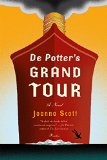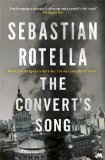Summary | Excerpt | Reviews | Beyond the book | Read-Alikes | Genres & Themes | Author Bio

A Novel
by Lawrence OsborneDavid Henniger is in trouble. Long before he kills a young Moroccan man in the high desert of the country as a result of drunk driving, his marriage to Jo is already shaky. Also in the bad news department: his medical practice in England is on unsure footing after a malpractice lawsuit. David and Jo are on their way to an upscale weekend party hosted by their expat friends Richard and Dally in a ksar (castle) in the Moroccan hinterland. Guests have flown in from all over Europe, the wine flows freely, elaborate food, dancing and drugs are all par for the course. When David hits and kills Driss, the young fossil seller who happens to step in front of the car, he and Jo don't know what to do with the body - as a quick solution, they bring it along to Richard and Dally's party.
So there is the body awaiting its burial while the party is in full swing. The servants, all locals, are horrified at first, and slowly they begin to build resentment against the uncaring, partying Westerners. Driss's father, Abdellah, comes to claim his son's body and insists that David come back with him to give his son a decent burial. From here the story diverges into two parallel narratives: one of the wild party in full swing and another following David as he goes along with Abdellah and his family to meet his fate in the desert.
At its core The Forgiven sets out to be a story about the clash of values - between east and west. But the Westerners at least, seem so tone-deaf to the cultural mores of Morocco that clashes, if any, seem contrived. There's a young dead man in the garage waiting to be buried yet all that the hosts can worry about is whether this accident is going to ruin the weekend party. Despite the accident, host Dally worries about the most banal superficialities: "Would strawberries be too predictable if they arrived in the frosted cups with the grape designs, or would they fall flat if they were served with creme fraiche as soon as everyone poured from the cars at the other end? Would the parasols be silly carried by the boys in white gloves? Would dust get into the creme fraiche and the perforated shortbread?" One can see Osborne's reasons for portraying the hosts and their guests, all Westerners, this way - they probably serve as pointers for just how far we can sink in search of hollow materialism. Yet both the hosts and the guests are painted in such one-dimensional tones, that it's hard to digest the lessons Osborne seems to want to drive home. In real life, even the most shallow people have some redeeming qualities, after all. Richard and Dally too seem curiously out of place in this alien landscape - sure they are expats, but in addition, the reader never gets a sense for their motivations, why they spend the kind of money they do, or even how they get all their riches.
The Berbers on the other hand, especially Driss's father Abdellah, seem to be painted in shades of gray and the reader can sympathize with the grieving father to a large extent. Osborne also writes movingly about the fossil industry (see 'Back Story') that caters primarily to tourists - about the young Moroccans working from dawn to dusk chipping away at one specimen that has the potential to feed an entire family for a month, all the while dreaming of escape.
What Osborne really succeeds in doing with The Forgiven is writing a terrific travelogue - which is unsurprising considering that he is an experienced travel writer. The Moroccan desert comes superbly alive in the novel - every detail is meticulously outlined. The desert roads, the palm trees, the foods, the mountains with their fossils, even the tiniest of villages in the remotest parts of the country, are all vividly described here. The novel is worth reading for this reason alone. In the end, you can almost feel the sand in your hair and taste it on your tongue. When David tucks into his goat tagine in one memorable scene, I dare you not to drool.
For a visual tour of the book, please visit my pinterest board.
![]() This review was originally published in The BookBrowse Review in October 2012, and has been updated for the
June 2013 edition.
Click here to go to this issue.
This review was originally published in The BookBrowse Review in October 2012, and has been updated for the
June 2013 edition.
Click here to go to this issue.

If you liked The Forgiven, try these:

by Joanna Scott
Published 2015
A gripping novel about a seemingly charmed marriage and a mysterious disappearance at sea.

by Sebastian Rotella
Published 2014
A global manhunt sweeps up a former federal agent when his childhood friend becomes the chief suspect in a terrorist rampage.
Your guide toexceptional books
BookBrowse seeks out and recommends the best in contemporary fiction and nonfiction—books that not only engage and entertain but also deepen our understanding of ourselves and the world around us.